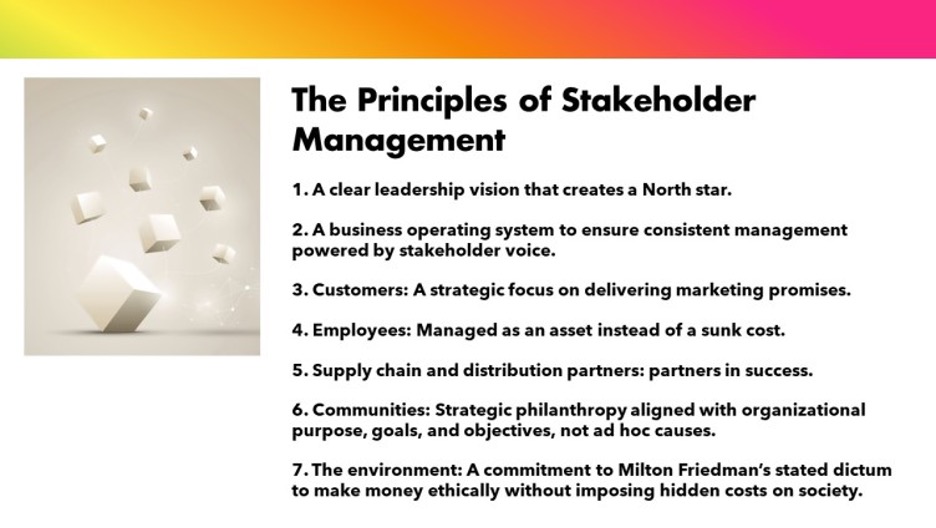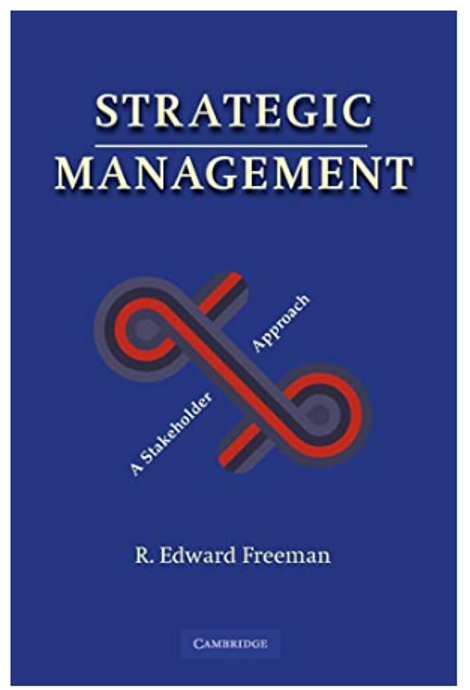Stakeholder Capitalism Update on the Fourth Anniversary of Its "Outing"
 On the fourth anniversary of the Aug. 19, 2023, Business Roundtable proclamation that ignited the debate about Stakeholder Capitalism, here’s an update on the impact of the publicity on a business field that goes back at least to the 1950s and arguably back to the days of John D. Rockefeller.
On the fourth anniversary of the Aug. 19, 2023, Business Roundtable proclamation that ignited the debate about Stakeholder Capitalism, here’s an update on the impact of the publicity on a business field that goes back at least to the 1950s and arguably back to the days of John D. Rockefeller.To benchmark your views on stakeholder capitalism, take this one-question poll expiring Aug. 26, 2023.
By Bruce Bolger
Well-Meaning Business Leaders Helped Stoke “Woke” and “Greenwashing”
Stakeholder Capitalism Is a Management System, Not an Ideology
More Media Discussion
No Agreement Yet on the Definition
Both the Right and Left Agree on a Movement Neither Has Heard of
The Next Big Challenge
Based on a daily analysis of worldwide coverage of stakeholder capitalism, the business concept continues to gain traction despite political headwinds in the US because of three factors: 1) the growing desire of people to invest in, work for, or do business with sustainable organizations; 2) the growing ability of analytics to reveal the true costs of customer and employee disengagement currently buried in most corporate balance sheets and profif/loss statements, and 3) the upcoming European Union Corporate Sustainability Directive, which will require an unprecedented level of disclosures on how medium to large companies keep their commitments to employees, customers, supply chain and distribution partners, communities, and the environment.
Well-Meaning Business Leaders Helped Stoke “Woke” and “Greenwashing”
The conflation of stakeholder capitalism with politics can be linked to the slew of public statements about the role corporations can play to address social issues during a period of heightened social tensions in the US made not only by the Business Roundtable in 2019, but by the World Economic Forum at its glamorous Switzerland forum in January 2020 in an the annual letter of Larry Fink of BlackRock during the same month, stating that companies can do more to address societal ills. This confluence of pledges sparked outcries of “woke” from the right and “greenwashing” from the left.
The critics on both the left and the right so far are being vindicated in some of their accusations. There are no public signs that the Business Roundtable has taken much serious action to clearly define, let alone, substantiate the pledge. Similarly, while the World Economic Forum has developed a set of reporting standards based on stakeholder management principles, they are of course voluntary and have received little publicity. Larry Fink says he has backed off of the use of the term ESG, is now saying stakeholder capitalism is simply better business (which is correct), and there is little talk of the stakeholder capitalism center that BlackRock reportedly was creating in January 2022. The integrity of ESG ratings are under question almost in direct proportion to the interest from investors in more transparent ratings.
Some advocates for stakeholder capitalism, such as Fortune magazine, continue to raise the notion that stakeholders want CEOs to take stands on public issues, suggesting that Americans want CEOs to take a stand. Others, such as Leo S. Strine, a former Delaware Supreme Court judge who helped promote the public benefits corporation statutes, strongly argues that corporations should stay out of politics and social issues unless they directly affect its stated purpose, values, goals and objectives. (The Enterprise Engagement Alliance, publisher of ESM, explicitly agrees with the position of Strine.) While people may say they wish to wish to have their CEOs speak out on social or political issues, it’s by no means clear they will agree on which stances they want their companies to take; going to work should be a refuge from politics.
Stakeholder Capitalism Is a Management System, Not an Ideology 
Unlike the impression given in the bulk of articles published on stakeholder capitalism, almost none of which have made any clear attempt to study the field, let alone define it, the concept did not begin with the Business Roundtable proclamation. In fact, it is a theory of management going back decades that focuses on enhancing returns for investors by creating value for customers, employees, supply chain and distribution partners, communities, and the environment.
Because no one talking or writing about stakeholder capitalism has apparently done much research, what is in fact a management system got conflated with politics. While this quote by the legendary total quality management guru W. Edwards Deming was published in 1993, it is based on his work in the 1950s in total quality management: “The aim proposed here for any organization is for everybody to gain—stockholders, employees, suppliers, customers, community, the environment—over the long term.”
 Two of Deming’s key principles are: 1) “Create constancy of purpose toward improvement of product and service, with the aim to become competitive, to stay in business and to provide jobs,” and 2), “Break down barriers between departments. People in research, design, sales, and production must work as a team, to foresee problems of production and usage that may be encountered with the product or service.”
Two of Deming’s key principles are: 1) “Create constancy of purpose toward improvement of product and service, with the aim to become competitive, to stay in business and to provide jobs,” and 2), “Break down barriers between departments. People in research, design, sales, and production must work as a team, to foresee problems of production and usage that may be encountered with the product or service.”In 1984, long before talk of woke, ESG, or corporate social responsibility, the University of Virginia professor R. Edward Freeman articulated the basis for stakeholder theory of organizational management and ethics in his book Strategic Management: A Stakeholder Approach. He “identifies and models the groups which are stakeholders of a corporation, and both describes and recommends methods by which management can give due regard to the interests of those groups. Stakeholder theory is a view of capitalism that stresses the interconnected relationships between a business and its customers, suppliers, employees, investors, communities, and others who have a stake in the organization. The theory argues that a firm should create value for all stakeholders, not just shareholders.”
His work helped give birth to decades of academic work on various aspects of stakeholder theory, little if any of which would provide fodder for right- or left-wing extremists.
While both Deming and Freeman make a strong argument for creating value through people, and the importance of ethics as a foundational rudder, neither talk about the need for organizations to take stands on social or political issues or to focus on “corporate social responsibilities.” Nor can one find much talk of corporate social responsibility outside of an organization’s responsibility to its own stakeholders and to ethical practice in the potentially hundreds of resources one can find in the above link to an academic meta-analyis or in the Enterprise Engagement Alliance library of stakeholder management resources. Generally, stakeholder capitalists look at ways that stakeholder management returns can provide benefits for investors by creating value for all stakeholders and the environment that address a broader definition of the bottom line than short-term profits for investors at the expense of stakeholders when necessary, since it is stakeholders, after all, whose engagement creates the profits.
Here is an overview of other trends in the world of stakeholder capitalism.
More Media Discussion
The topic continues to gain traction worldwide based on daily Google Alert tracking, but relatively few people or organizations describe themselves as active advocates. That said, there are very few organizations that publicly call themselves stakeholder capitalists beyond the leaders at Fortune, JUST Capital, iincluding about a dozen think tanks and associations.
No Agreement Yet on the Definition
Despite the Enterprise Engagement Alliance's early attempt with Martin Whittaker of JUST Capital and Alex Edmans of the London Business School, we are still debating the definition, based on a recent Harvard Business Review article.
Both the Right and Left Agree on a Movement Neither Has Heard of
While JUST Capital surveys consistently show that both the right and left can agree on the basic principles of stakeholder capitalism focused on enhancing returns for investors by creating value for customers, employees, supply chain and distribution partners, communities, and the environment, most remain unaware of the concept.
The Next Big Challenge
Only a very few people have any training in the basic principles and implementation process of stakeholder management. The new EU Corporate Sustainability Reporting Directive, which carries the force of law, may drive greater attention to a stakeholder approach to management.
For More Information
Bruce Bolger, Founder
Enterprise Engagement Alliance at TheEEA.org
914-591-7600, ext. 230
Bolger@TheEEA.org
ESM Is Published by The EEA: Your Source for Effective Stakeholder Management, Engagement, and Reporting
Through education, media, business development, advisory services, and outreach, the Enterprise Engagement Alliance supports professionals, educators, organizations, asset managers, investors, and engagement solution providers seeking a competitive advantage by profiting from a strategic and systematic approach to stakeholder engagement across the enterprise. Click here for details on all EEA and ESM media services.
1. Professional Education on Stakeholder Management and Total Rewards
- Become part of the EEA as an individual, corporation, or solution provider to gain access to valuable learning, thought leadership, and marketing resources to master stakeholder management and reporting.
- The only education and certification program focusing on Stakeholder Engagement and Human Capital metrics and reporting, featuring nine members-only training videos that provide preparation for certification in Enterprise Engagement.
- EEA books: Paid EEA participants receive Enterprise Engagement for CEOs: The Little Blue Book for People-Centric Capitalists, a quick implementation guide for CEOs; Enterprise Engagement: The Roadmap 5th Edition implementation guide; a comprehensive textbook for practitioners, academics, and students, plus four books on theory and implementation from leaders in Stakeholder Management, Finance, Human Capital Management, and Culture.
2. Media
- ESM at EnterpriseEngagement.org, EEXAdvisors.com marketplace, ESM e–newsletters, and library.
- RRN at RewardsRecognitionNetwork.com; BrandMediaCoalition.com marketplace, RRN e-newsletters, and library.
- EEA YouTube Channel with over three dozen how-to and insight videos and growing with nearly 100 expert guests.
3. Fully Integrated Business Development for Engagement and Total Rewards
Strategic Business Development for Stakeholder Management and Total Rewards solution providers, including Integrated blog, social media, and e-newsletter campaigns managed by content marketing experts.
4. Advisory Services for Organizations
Stakeholder Management Business Plans; Human Capital Management, Metrics, and Corporate Sustainability Reporting for organizations, including ISO human capital certifications, and services for solution providers.
5. Outreach in the US and Around the World on Stakeholder Management and Total Rewards
The EEA promotes a strategic approach to people management and total rewards through its e-newsletters, web sites, and social media reaching 20,000 professionals a month and through other activities, such as:
- Association of National Advertisers Brand Engagement 360 Knowledge Center to educate brands and agencies.














